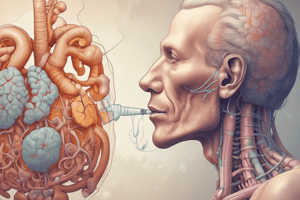Podcast
Questions and Answers
What is an acute exacerbation of chronic obstructive pulmonary disease (COPD)?
What is an acute exacerbation of chronic obstructive pulmonary disease (COPD)?
- A permanent worsening of symptoms from the patient's usual stable state
- A sustained worsening of symptoms from the patient's usual stable state (correct)
- A sudden improvement of symptoms from the patient's usual stable state
- The usual day-to-day variation of symptoms
What triggers acute exacerbations of COPD?
What triggers acute exacerbations of COPD?
- Bacterial infections, viral infections, and other factors such as smoking (correct)
- Only cardiorespiratory failure
- Only viral infections
- Only bacterial infections
When considering antibacterial treatment for acute exacerbations of COPD, what factors should be taken into account?
When considering antibacterial treatment for acute exacerbations of COPD, what factors should be taken into account?
- Only the severity of symptoms
- Only the patient's age and weight
- The severity of symptoms, sputum colour changes, and the need for hospital admission (correct)
- Only the patient's history of hospital admission
What should be considered during reassessment of acute exacerbations of COPD?
What should be considered during reassessment of acute exacerbations of COPD?
When should patients with acute exacerbations of COPD be referred to hospital?
When should patients with acute exacerbations of COPD be referred to hospital?
Why should patients with acute exacerbations of COPD be reassessed if their symptoms worsen rapidly or significantly?
Why should patients with acute exacerbations of COPD be reassessed if their symptoms worsen rapidly or significantly?
What is the recommended duration of antibacterial therapy for this condition?
What is the recommended duration of antibacterial therapy for this condition?
When should the choice of antibacterial therapy be reviewed?
When should the choice of antibacterial therapy be reviewed?
What is the oral first-line antibacterial therapy for this condition?
What is the oral first-line antibacterial therapy for this condition?
When should a local microbiologist be consulted?
When should a local microbiologist be consulted?
What is the alternative oral antibacterial therapy for patients at high risk of treatment failure?
What is the alternative oral antibacterial therapy for patients at high risk of treatment failure?
When is intravenous antibacterial therapy recommended?
When is intravenous antibacterial therapy recommended?
Flashcards are hidden until you start studying




